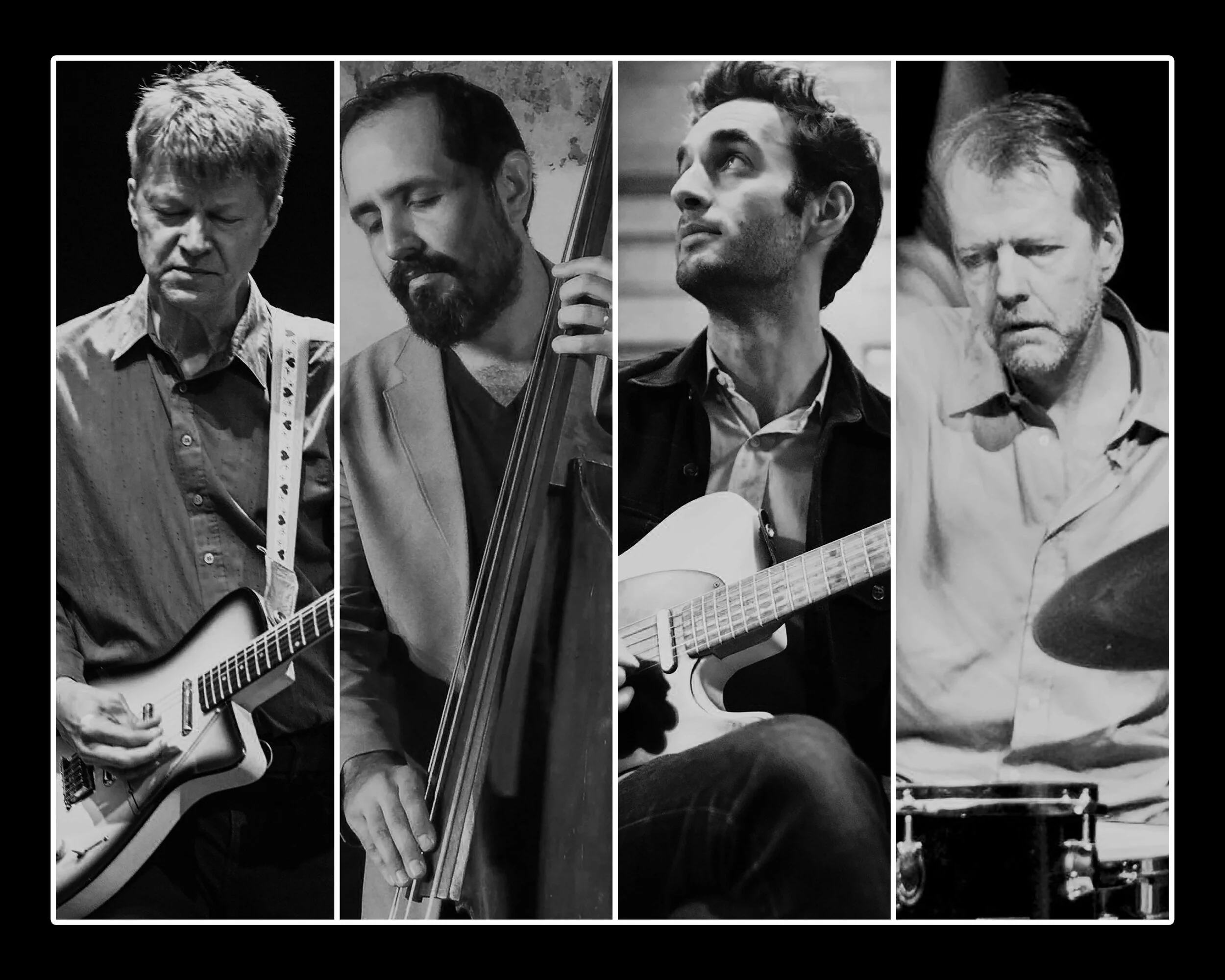Of all the rich and varied projects guitarist Nels Cline has pursued since his emergence as a leader in the late 1980s, his two-guitar duo with Julian Lage, documented on the 2014 album Room, ranks among the most special. “When Julian and I started playing together it kicked my ass hard,” Cline told JazzTimes around the time of Room’s release. “At the same time it inspired me and refreshed my soul.” Lage, for his part, declared he had “found his people” playing with Cline: “At last I found a scenario where … you could be free and adventurous, you could utilize sound and be extremely melodic and evocative.”
The duo is still ongoing, but it is morphing and expanding. With Currents, Constellations, Cline’s second Blue Note release, we hear the debut of The Nels Cline 4, made up of Cline and Lage plus the fierce and versatile rhythm section of bassist Scott Colley and drummer Tom Rainey. All of the music is Cline’s, save for a haunting and rare Carla Bley gem from the Jimmy Giuffre 3 songbook.
Known as the lead guitarist of Wilco since 2004, and one of Rolling Stone’s “100 Greatest Guitarists,” Cline is coming off the success of his 2016 Blue Note debut Lovers, a “quietly ravishing double-album” (NY Times) featuring Cline with a large ensemble conducted and arranged by Michael Leonhart that was “wildly inventive in its watercolored way” (Rolling Stone). On Currents, Constellations Cline embraces a sparser but edgier instrumentation, which serves the adventurous thrust of the music, brimming as it does with raw energy and wild beauty.
“Even in the earliest days of the duo we used to say, ‘I wonder what we’d do if we ever had a rhythm section,’” Cline recalls. “At the time, Julian and Scott were playing in Gary Burton’s quartet and Scott later joined Julian’s trio. Interestingly, it turned out that Scott and Tom were a running rhythm section through the ’90s and played hundreds of gigs together, but hadn’t done so in years. So I had a residency at The Stone [in New York City] and wanted to showcase this quartet. I brought in a few themes and we just kind of went for it. Everyone was enthusiastic about continuing the work.”
Cline establishes a scintillating rapport with Lage as he did in the duo, though Lage is tasteful enough to play a supremely musical support role as well. The point was less to feature “sovereign” guitar solos, in Cline’s words, and more to facilitate an ensemble sound, whether marked by heated collective improvisation or a more delicate and precise approach on the contemplative pieces.
“Furtive,” the leadoff track, begins with a loud and dissonant chord right into a Rainey drum solo before the theme emerges. Cline’s inspiration here was Duke Ellington’s “Tourist Point of View” from The Far East Suite: “Uptempo with a vamp, amazing dense harmonies,” Cline marvels. “I just have tiny bits of written material connected by improvisation and I cue things with numbers: I hold up two and we play cue number two. It’s a way to encourage guitar interaction that’s non-soloistic and that lets Scott and Tom blaze away.”
With “Swing Ghost ‘59” Cline intended to portray “a musical conflict between swung and even eighth notes,” he says. “It starts with swing, and then swing loses to pounding eighth notes, only to go into this sort of mechanized world that dissolves into a kind of retro swing-era guitar to recap the swing theme. And then once again swing is defeated. It’s like the poignant ballad of swing-time in pop, and how it doesn’t exist anymore. It’s not a lament, I’m just amusing myself with the idea.”
Cline’s first title for “Imperfect 10” was “Jazz Fusion Composition.” “I think a couple of the guys are disappointed that it’s not still called that,” Cline laughs. “It’s a straightforward rockin’ tune that’s fun to play. I suggested this beat to Tom that he does periodically, and once we started that it was off to the races.”
The spacious ballad “As Close As That” was chiefly inspired by Ralph Towner. “It reminds me of pieces of Ralph’s like ‘Distant Hills’,” Cline says. “I think that might be why I titled it the way I did. There’s a piece on Destroy All Nels Cline (2001) called ‘The Ringing Hand’ that’s like the epic dramatic version of this kind of song. There’re a few lurking around in my oeuvre. It’s just me soloing on this, and Julian being a real bro and playing a background role.”
“Amenette” was first a duo piece on Room, and indeed after the opening unison line (played with remarkable precision) Cline and Lage revert to a duo right away. The solo spotlights and configurations continue to change throughout the performance. “The line enables us to engage in free jazz,” Cline says. “It prompts a certain type of interplay and lets us feature everybody a little bit. The riff reminds me of Scott Amendola’s ‘Street Beat’ and also Ornette [Coleman], hence ‘Amenette.’”
The Jimmy Giuffre 3 has been desert-island listening for Cline for many years, and Carla Bley’s rare “Temporarily” is from that mysterious body of work. “After pondering the direction of the band,” Cline says, “I thought this song pretty much defined what I wanted to do: to have beautiful, deceptively simple but still very catchy thematic material that paves the way to completely spontaneous music that we might broadly term chamber jazz. And that’s what you have here, our version of that. There’s no other recording of this song that I know of anywhere. It’s a Carla Bley deep cut. I don’t know what the story of that song is.”
The two-part “River Mouth” is “the kind of piece I like to listen to,” Cline says. “Julian’s playing the arpeggios, specific voicings that I wrote. It’s very post-In A Silent Way to have these dyads that drift out of time. This is another one where I play the solo and Julian the supportive part and we play a ton of unison stuff together. I’m looking forward to seeing where that song goes as we start playing it live more. I see the whole piece as being like a river — it doesn’t end, it’s perpetual. It ends the same way it began. It’s a big circle.”
“For Each, A Flower” is a closing homage to those recently passed: “John Abercrombie, Geri Allen, Bill Collings, Bill Horvitz, John Shifflett: it was just getting to be too much,” Cline says. “So I wrote this piece. It could even be played solo. It’s a coda. I’m just blowing a kiss.”

